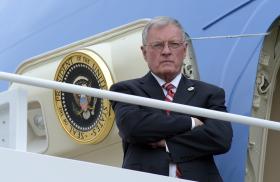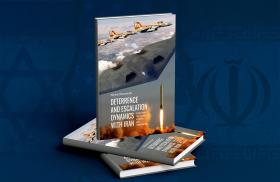
- Policy Analysis
- PolicyWatch 4111
Israel Is Pushing Arab Peace Partners to Their Limits

Although regional peace agreements have survived the Gaza war and other recent crises, the increasingly explicit red lines being laid down by Arab capitals need to be taken seriously in Jerusalem and Washington.
When the Arab League and the Organization of Islamic Cooperation convened an emergency joint summit in Qatar this month, their ostensible purpose was to support their Gulf neighbor after Israel’s strike on Hamas leaders in Doha. Yet the content of their September 15 communique went far beyond that—rather than focusing on the Qatar strike, much of the document dealt with Palestinian issues, offering a list of collective and unilateral steps that the fifty-seven states in attendance might take to “prevent Israel from continuing its actions against the Palestinian people.” In addition to boycotts, legal moves, and a campaign to suspend Israel’s United Nations membership, the document called on Israel’s Arab peace partners to consider “reviewing diplomatic and economic relations with it.”
Regrettably, such warnings are not surprising after nearly two years of war in Gaza. Yet the talk of Arab governments openly reconsidering their peace agreements with Israel is hardly new. Well before the Doha attack, three of the five states formally at peace with Israel—Egypt, Jordan, and the United Arab Emirates—offered hints that they are contemplating a recalibration of relations. Although none of them seem imminently poised to freeze or abandon Wadi Araba, Camp David, or the Abraham Accords, recent statements by senior officials in each country have laid down red lines as to what specific Israeli actions might spur such a move.
Two Years of Cumulative Tensions
When the Gaza war erupted in October 2023, Amman, Cairo, and Abu Dhabi initially called for de-escalation rather than castigating Israel (or, notably, condemning Hamas for the attack that precipitated the conflict). Yet as the Palestinian death toll climbed and tragic images continued to emerge from Gaza, their official positions began to fall more in line with the angry public sentiment that swept each country. For instance, Egypt’s government organized mass demonstrations soon after Israel’s air force began bombarding Gaza; Jordanian authorities allowed a series of large protests adjacent to Israel’s empty embassy in Amman; Jordan withdrew its envoy from Tel Aviv in November 2023; Egypt’s top diplomat left in September 2024; and Bahrain’s ambassador departed this April. The UAE is also reportedly mulling whether to shutter its embassy after the Qatar attack, while Morocco does not even have an embassy in Israel despite joining the Abraham Accords five years ago.
Indeed, the impact of Israel’s military operations in Gaza and other parts of the Middle East has been cumulative. No doubt, the Doha strike shocked the region, but many other actions have contributed to the spike in tensions. Among them are the Israeli government’s announced plans to encourage voluntary relocation of much of Gaza’s population to third countries, as well as to settle E1, a portion of the West Bank that runs from Jerusalem to Maale Adumim and could effectively preclude a contiguous Palestinian state. Such proposals have raised the already high temperature in the region, sparked weeks of angry statements, and, for the first time in recent memory, raised the specter that Arab-Israel peace agreements could be reversed.
Stressed Ties with the UAE
Until recently, the Emirates were a relative bright spot amid these tensions, maintaining the region’s warmest relations with Israel since 2020 and even during the Gaza war. Just days before the Doha strike, however, a senior Foreign Ministry official told the Times of Israel, “Annexation would be a red line for my government...[I]t would foreclose the idea of regional integration.” Initially, the statement was understood as a threat to withdraw from the Abraham Accords. Subsequent unattributed Emirati statements suggested that if Israel proceeds with annexation, Abu Dhabi might downgrade relations to more of an Egypt/Jordan-style “cold peace” rather than cutting ties altogether. Yet this clarification should provide little solace to Jerusalem or Washington, both of whom still seem intent on deepening—not downgrading—the accords and bringing in more signatories.
Prime Minister Binyamin Netanyahu exacerbated the situation soon afterward, stating on September 10 that regional officials who condemned the Qatar strike “should be ashamed of themselves.” He also pledged that Israel would continue targeting Hamas abroad if necessary, including in Qatar. In response, the Emirati Foreign Ministry summoned Israel’s deputy ambassador to protest Netanyahu’s “hostile and provocative” remarks. And in a preview of what a cold peace might look like, officials announced that Israeli firms would be excluded from this November’s Dubai Air Show. Even so, Israeli-Emirati relations look relatively good compared to the worsening situations with Jordan and Egypt.
Difficulties Across the River
Jordan’s proximity and demography have long made it extremely sensitive to developments in the West Bank and Gaza. An estimated 60 percent of the kingdom’s population is of Palestinian origin, though popular anger is not limited to this group. Twice in the past year—most recently on September 18—Bedouin tribesmen opened fire at Jordanian border crossings, killing Israeli soldiers. Queen Rania (who is also Palestinian) and Foreign Minister Ayman Safadi have been especially critical of Israel’s campaign in Gaza since 2023, and their statements escalated even further in recent weeks following Israel’s announcements on annexation and displacement.
For example, at an Arab League ministerial meeting earlier this month, Safadi called for “collective Arab action” and a “comprehensive strategy—a political, economic, legal, and defense strategy—that employs all available tools to protect our future and interests.” He also defined Jordan’s “red line” as the “displacement of Palestinians from their homeland,” which he said the kingdom would confront “with all our might.”
To be sure, Jordanian foreign ministers have traditionally played the bad cop in relations with Israel, enabling the king to take a more moderate, conciliatory line. Lately, though, even this longstanding diplomatic division of labor has been dissipating. At the Arab-Islamic summit, King Abdullah joined the chorus for tougher measures, urging his colleagues to “review all our tools of joint action to confront the threat of this extremist Israeli government.” In his view, the Doha strike “is proof that the Israeli threat has no limits. Our response must be clear, decisive, and deterrent.” The king expressed similar sentiments this week at the UN General Assembly, criticizing Jerusalem’s plans for “Greater Israel.”
Tanks on the Border with Rafah
The most worrisome deterioration is happening with Egypt. From the beginning of the Gaza war, Cairo warned against any attempted displacement of Palestinians into the Sinai Peninsula, while Israel accused its neighbor of enabling weapons smuggling to Hamas and “imprisoning” Palestinians in Gaza by refusing to accept refugees fleeing the fighting. In May 2024, Egypt went a step further by signing onto South Africa’s genocide case against Israel at the International Court of Justice, infuriating Jerusalem.
Tensions have only increased in 2025. Foreign Minister Badr Abdelatty repeated Egypt’s red line earlier this month, stating, “Displacement is not an option...and we will not allow it to happen.” In addition, the Doha strike and Netanyahu’s pledge to continue attacking Hamas outside Gaza raised fears that Israel might even target Egypt, which has hosted some of the group’s leaders as part of its mediation efforts. Cairo subsequently warned Israel that any violation of Egypt’s sovereignty would result in “catastrophic repercussions.”
Not surprisingly, President Abdul Fattah al-Sisi’s speech at the Arab-Islamic summit was particularly harsh. He warned Israel that continuing its current trajectory will not only limit opportunities for new peace agreements, but also abort “existing peace accords.” Accentuating the latter point, he referred to Israel as “the enemy”—the first time an Egyptian leader had reportedly done so since 1977—and referenced a proposal (apparently rejected by other Arab states) to establish a unified Arab military force to better contend with the Israeli threat. Meanwhile, leading anchors on state-controlled television are openly discussing the possibility of military confrontation, seemingly conditioning the public for war.
Such rhetoric is worrisome in part because the Sinai has become highly militarized in recent years. Beginning in 2013, Israel repeatedly approved Egyptian requests to flood the peninsula with troops, tanks, and other military equipment, vastly exceeding the terms of the Camp David treaty’s security annex. The original impetus for this arrangement was to help fight a rising Islamist insurgency in the Sinai, since Egypt’s existing assets and personnel in the area were insufficient. By 2022, the terrorists had largely been defeated with Israel’s assistance, yet Jerusalem never pressed for a reversion to the treaty’s original terms—until this week, when Netanyahu reportedly asked Washington to intervene on the issue. For now, hundreds of tanks and thousands of Egyptian troops remain stationed along the border, increasing the possibility of large-scale conflict if tensions keep rising.
The U.S. Role
Defying the odds, all five Arab-Israel peace agreements have survived two years of horrific war in Gaza. That’s the good news. The bad news is that a host of thorny issues—the lack of an imminent end to the war, the expansion of Israeli military activities across the region, and the ideas percolating among senior Israeli officials to annex West Bank territory and facilitate the relocation of Gazans—are pushing these peace partners to their limits. Both their articulation of explicit red lines and their threats to abort peace agreements should be taken seriously.
During the first Trump administration, Washington and its Arab partners essentially forced Israel to choose between annexation and normalization. Jerusalem opted for the Abraham Accords, opening a new era of integration with the Middle East. The October 7 attack changed Israel’s approach, but its desire for regional integration ostensibly remains. For its part, the United States has invested major diplomatic capital and billions of foreign assistance dollars to promote normalization, building a strategic architecture that has greatly benefited U.S. and Israeli national security. Reversing or at least halting the erosion of these gains should be an administration priority, since setbacks in hard-won peace agreements would serve nobody’s interests.
David Schenker is the Taube Senior Fellow at The Washington Institute and director of its Rubin Program on Arab Politics.



